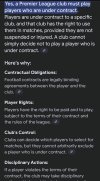Dribble
Well-Known Member
But what happens if it's the other way around? Let's say the player wants to stay, but isn't being played regardless of contract length, can he still terminate his contract?Webster FIFA Ruling
The Webster ruling is a landmark case in association football law involving Andy Webster, a Scottish defender who played for Heart of Midlothian. It stemmed from his decision in 2006 to invoke Article 17 of FIFA's Regulations for the Status and Transfer of Players, which allows players under the age of 28 to unilaterally terminate their contracts after three years, or players aged 28 and over after two years, provided they pay compensation. Webster, who had signed a four-year contract with Hearts in 2003, sought to leave the club after his third year, citing a lack of agreement on a new deal and dissatisfaction with the club's treatment.
Initially, FIFA's Dispute Resolution Chamber ruled that Hearts were entitled to £625,000 in compensation, based on Webster's future wages and earning potential, and found him guilty of terminating his contract "without just cause" on a technicality due to late notification. He was also suspended for the first two matches of the 2007–08 season. Hearts appealed this decision, and on 30 January 2008, the Court of Arbitration for Sport (CAS) reviewed the case and reduced the compensation to £150,000, which was the value of the remaining term of his contract at the time of his departure.
The ruling was significant because it established a precedent for player freedom of movement, similar in potential impact to the Bosman ruling of 1995, and was hailed by players' unions as a major step forward for player rights. It meant that clubs could no longer hold players to long-term contracts indefinitely, forcing them to re-evaluate their strategies, particularly regarding contract lengths and player development. However, the ruling also caused concern among clubs, who feared it would lead to a decline in transfer fees and significant accounting losses due to the need to depreciate player contracts over a maximum of three years. Despite the controversy, the case has been cited as a pivotal moment in football law, demonstrating the power of Article 17 to empower players.
I also don't get how a club can get compensation for the remaining wages the player has yet to receive. Unless I'm misunderstanding something?


